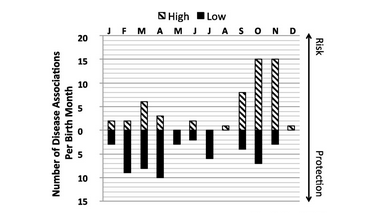One of the many things that is simply out of our control is our birthday. Month, day, time – all of these are details that we cannot predetermine. Interestingly enough however, there have been studies conducted to determine if such factors that are beyond our control, like the month in which we were born, could impact us, and as it turns out, your birth month really could affect your health!
Which Month Is Best?
It all started a few years back when a PhD student at Columbia University Medical Center named Mary Boland analyzed old studies focusing on how one’s birth month affected one’s risk of developing asthma, which then led her to become the lead author of this study published in the Journal of the American Medical Informatics Association on how your birth month affects your health.
By using the medical records of 1.7 million people who were treated between 1985 and 2013 at the New York Presbyterian Hospital/Columbia University Medical Center, researchers were able to determine the correlation between one’s risk of various diseases and his/her birth month.
Below are some of the study’s key findings:
- Those born in May have the lowest birth-month-related disease risk while those born in October have the highest birth-month-related disease risk (see graph below).

- Late-winter and early spring babies are more likely to develop heart disease later in life.
- Those born between January and June tend to have shorter lives than those born between July and December.
- Those with March birthdays have the greatest risk of developing an atrial fibrillation (abnormal heartbeat), congestive cardiac failure (heart failure due to the heart not pumping blood effectively), mitral valve disorder (the valve between the heart’s left atrium and ventricle doesn’t function correctly) and prostate cancer.
- Those born in the later months of the year, especially November, are at a greater risk of developing attention deficit hyperactivity disorder (ADHD).
- A total of 55 diseases correlated with the season in which one was born.
So Now What?
It’s very important to note that the results of this study revealing how your birth month affects your health were not published as a nationwide diagnosis – these results simply show which diseases one is at a greater risk of developing. In other words, if you’re an October baby, don’t fret!
On the contrary, researchers are hopeful that many good things can come out of these surprising results, such as discovering new risk factors and preventative measures. For example, if a person born in March knows that they are at a greater risk of developing a heart disorder, then he/she can work with a physician to focus on early prevention strategies to not only decrease this risk, but also to boost their overall health.
Although these results can be beneficial in raising awareness of one’s disease risk, even the study’s lead author agrees that one’s diet and exercise are much greater factors when it comes to determining one’s risk for diseases than one’s birth month. As long as you regularly visit your physician and live an active and healthy lifestyle, then you’ll have many more birthdays to celebrate, regardless of your birth month!

